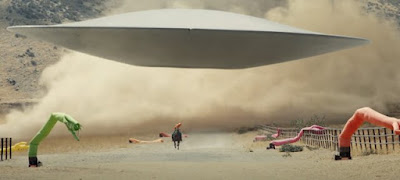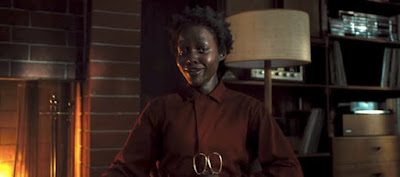or
Close Encounters of the Herd Kind
"Nahum 3:6: I will cast abominable filth upon you, make you vile, and make you a spectacle."
Jordan Peele has made you a spectacle—not of you, but for you—and like any great spectacle, sublime or tragic, you can't look away.
Nope is about a bunch of things—about people's need for the spectacular, and to believe anything to fulfill it, it's about instinct versus learning, about how neither one can save you when you're considered merely prey, and that Nature has its own "advantage" baked in just like a casino.
It's also about how we're all animals, basically, and no sophistication of the cerebral cortex can erase the fact that we're all made of meat. It's like Peele has melded Steven Spielberg's first hits Jaws and Close Encounters with their separate senses of primal terror and ecstatic wonder and smooshed them together to make one over-the-top bonkers film, one that's gorgeous to look at (lensed by Hoyte Van Hoytema) has a great, itchy score, and has enough humor and suspense to make you forget you might be watching a "message" movie. It has "bite."
In Aqua Dulce, California, The Haywood Hollywood Horses training facility squats like a dry oasis. The Haywood's are descendants of the African American jockey photographed in Eadweard Muybridge's The Horse in Motion, one of the very earliest cabinet card sets, which, in turn, was used in early zoopraxiscope presentations, making it the first motion picture projection presentation, some 12 years before Edison, and eight years before the proposals of Louis LePrince in France.Now, the Haywood ranch is run by Otis Haywood (Keith David—you'll recognize him by his distinctive narrator's voice), who still supplies trained animals for films. One day, out with his son O.J. (Otis Jr. played by Daniel Kaluuya), Otis Sr. is killed when metal objects fall inexplicably out of the sky and he is killed by a nickel plunging through his eye and embedding in his skull. His kids, O.J. and Emerald (Keke Palmer) try to keep the ranch afloat, but it's hard going. O.J. is not the most communicative soul, dealing with horses better than people, most specifically his sister "Em" who is focusing on her own career as a writer, director, producer and less on the old horse business.
In Aqua Dulce, California, The Haywood Hollywood Horses training facility squats like a dry oasis. The Haywood's are descendants of the African American jockey photographed in Eadweard Muybridge's The Horse in Motion, one of the very earliest cabinet card sets, which, in turn, was used in early zoopraxiscope presentations, making it the first motion picture projection presentation, some 12 years before Edison, and eight years before the proposals of Louis LePrince in France.Now, the Haywood ranch is run by Otis Haywood (Keith David—you'll recognize him by his distinctive narrator's voice), who still supplies trained animals for films. One day, out with his son O.J. (Otis Jr. played by Daniel Kaluuya), Otis Sr. is killed when metal objects fall inexplicably out of the sky and he is killed by a nickel plunging through his eye and embedding in his skull. His kids, O.J. and Emerald (Keke Palmer) try to keep the ranch afloat, but it's hard going. O.J. is not the most communicative soul, dealing with horses better than people, most specifically his sister "Em" who is focusing on her own career as a writer, director, producer and less on the old horse business.
As a result, O.J. is selling off horses to a recent nearby attraction, Jupiter's Claim, a western theme park run by Ricky "Jupe" Park (Steven Yeun), former child actor, and one of the survivors of the infamous "Gordy's Home" Incident—where, years earlier—and, for us, at the beginning of the movie—on the set of a comedy television series, a chimpanzee, startled by a popping helium balloon, viciously attacked the other performers, killing and maiming them. Ricky runs the park, but also exploits the tragedy by charging the obsessed, tours through his personal memorabilia from "The Incident".
Then, one dark and stormy night, O.J. notices that one of the horses is out of the stable, and when he investigates, sees that electricity is shutting down around the area, and a sand tornado touches ground, spooking the horse, and making it run. It's dark and all, but O.J. thinks he sees an object moving through the sky, fast, followed by an eerie sound of terror. When he comes back home, the lights are back on, but he's spooked. Something weird is going on.
Emerald hears O.J.'s story and her impulse is to get it on camera and exploit it—get "the money shot", or, better still, get "the Oprah shot"—so they head to the local Fry's (one's still open?), where their insistence on security cameras that can look UP and can operate once the grid goes down attracts the interest of one of the employees, Angel (Brandon Perea) who helps them install their systems. A conspiracy wonk, he links in to their system on their first night to get "footage" which fails, due to natural and unnatural-to-Earth interference. Another incident brings in the interest of cinematographer Antlers Holst (Michael Wincott), obsessed with obtaining "the impossible shot."
Around about here things get less speculative and more specific, but the group's attempts to record the UFO—"They're called UAP's now"—are intertwined with each participant's specialty skills: Holst's photography skills, O.J.'s training skills, Angel's ability...to be irritating, frankly, and Emerald's inability to stick to the plan. They're disparate attitudes and personalities almost makes them akin to the Pequod's crew hunting "Moby Dick." But, their prickly desert personalities all make their stake-out a multi-layered and evolving plan.My description of thing makes it sound simple, but Peele's approach is anything but, starting with opening with that "Gordy's Home" incident—which apparently has nothing to do with the movie, except to serve as a background motivation for one of the characters. Then, he goes to that "raining metal" sequence, and jumps forward to some time later, when the ranch is having hard times. It's disorienting and you wonder if you're missing something. You're not. Peele's just building the mystery and tightening the screws, as he builds in details to explain something unexplainable (although a couple of things will never be explained). It's like he's training us.
And it works gang-busters. I defy anyone not to be peering at all points of the screen for a tell-tale sign as you peer along with the characters for a glimpse of the mystery. And that's part of the fun. Peele has, so far, at least, included the audience as part of the drama, making them co-conspirators in his manipulation games. He directs the gaze, but he also indicts the mind. Here, he's made something mesmerizing enough that we can't take our eyes off it. And, ironically, that's just the sort of thing that could doom the characters. One can almost hear Peele cackling in the background at the joke of it all. "Fools! You'd be snapped up in a minute!"
But, Nope is a step forward. Here, he's making a movie that satisfies his need for detail, but boils it down to simple concepts that are achievable (and perceivable) as visually spectacular. His last film, Us, reached for something big, but couldn't quite achieve it because the conception of it was interesting...but not awe-inspiring. Here, he goes for the Big Moments and pulls them off extraordinarily, without overwhelming the tension of the movie. Nope is a step up for a film-maker who's just exploring his abilities, while paying homage to, but not whole-sale stealing from, the movies that inspired him. Peel had me at Get Out, but I'm looking forward to his next one with even higher expectations.























































